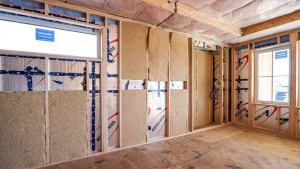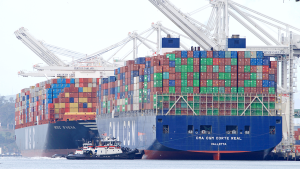The coronavirus could be a wakeup call for economies dependent on global trade to make sure the supply chain is “closer to home” in the future.
That is the message from Benjamin Tal, chief deputy economist, CIBC, who suggested that in five to 10 years, COVID-19 might be remembered as a catalyst to de-globalization that started with the trade wars between China and the U.S.
“It won’t reverse globalization, but it will modify it,” Tal told delegates to the 20th annual Ontario Construction Secretariat’s State of the Industry and Outlook conference recently at the Toronto Congress Centre.
He said monetary policies such as interest rate cuts can’t stop an economic slowdown because the problems are related to supply and demand. China’s export of “intermediate goods” shipped to become finished goods in North America and Europe, for example, has been cut off because of the coronavirus.
He told delegates Canada is either in a recession or close to one.
While recent interest rate cuts won’t pick up the economy, they can have a positive impact on the development industry. “I don’t think your industry will be booming anytime soon, but I think it will be able to sustain the pain — at least for a while,” Tal said.
He said the U.S./China trade wars have impacted the development industry in Canada, with fewer condo developments seeing Chinese investment. “Everything is interrelated.”
Still, Tal told the audience at the OCS conference that the development/construction industry could see promising prospects ahead because he believes the federal government will open its purse strings for infrastructure development to spur the economy.
We have to build smarter, be more creative and find a way to limit construction costs,
— Benjamin Tal
CIBC
Canada will continue to see an influx of international competition in the construction world — many of those companies with advanced technologies for speed and efficiency of construction.
“There is a lot of pressure on innovation…because the labour shortage will be with us for a while. We have to build smarter, be more creative and find a way to limit construction costs,” he said.
As much as times will be trying for many in the construction industry, he expects companies in many sectors won’t turn to significant staff layoffs, but rather try to “swallow the pain for now” to avoid labour shortages later when the economy picks up steam.
Tal said while Canada has signed numerous trade agreements with countries overseas in recent years, its proportion of trade with the U.S. has largely remained unchanged.
While the U.S. has gone through its longest expansion, that expansion has been “muted” largely because of aging workers, Tal told the audience. The fastest growing segment of the labour market is people 55 years or more — people who “are not asking for a (pay) raise. That is disinflationary.”
Tal added the mismatch in the labour market — “people without jobs, jobs without people” — is “destroying, changing the wage mechanism as we know it.”
While Canada is among the most educated countries in the world, it also tops the western world for the number of educated people living in poverty. Tal blamed an education system that is not keeping pace with the fast-paced changing labour market.
“We have to rethink our education system,” he said, suggesting a “dual system” of education such as in Germany where a student can graduate with a BA majoring in a soft skill but minoring in a hard skill such as a building trade.
The soft skills are important because they help graduates operate and grow a business such as a construction company.
He called the negative interest rate market that some countries have turned to as “madness. It is like a Black Hole: the minute you get there you can’t get out…like Germany, like Japan.” Negative interest rates result in people buckling down and saving more money, rather than putting it back into the economy.
He said while high interest rates can destroy a company (an economy), low interest rates can’t “lift you” out of hard times.











Recent Comments
comments for this post are closed